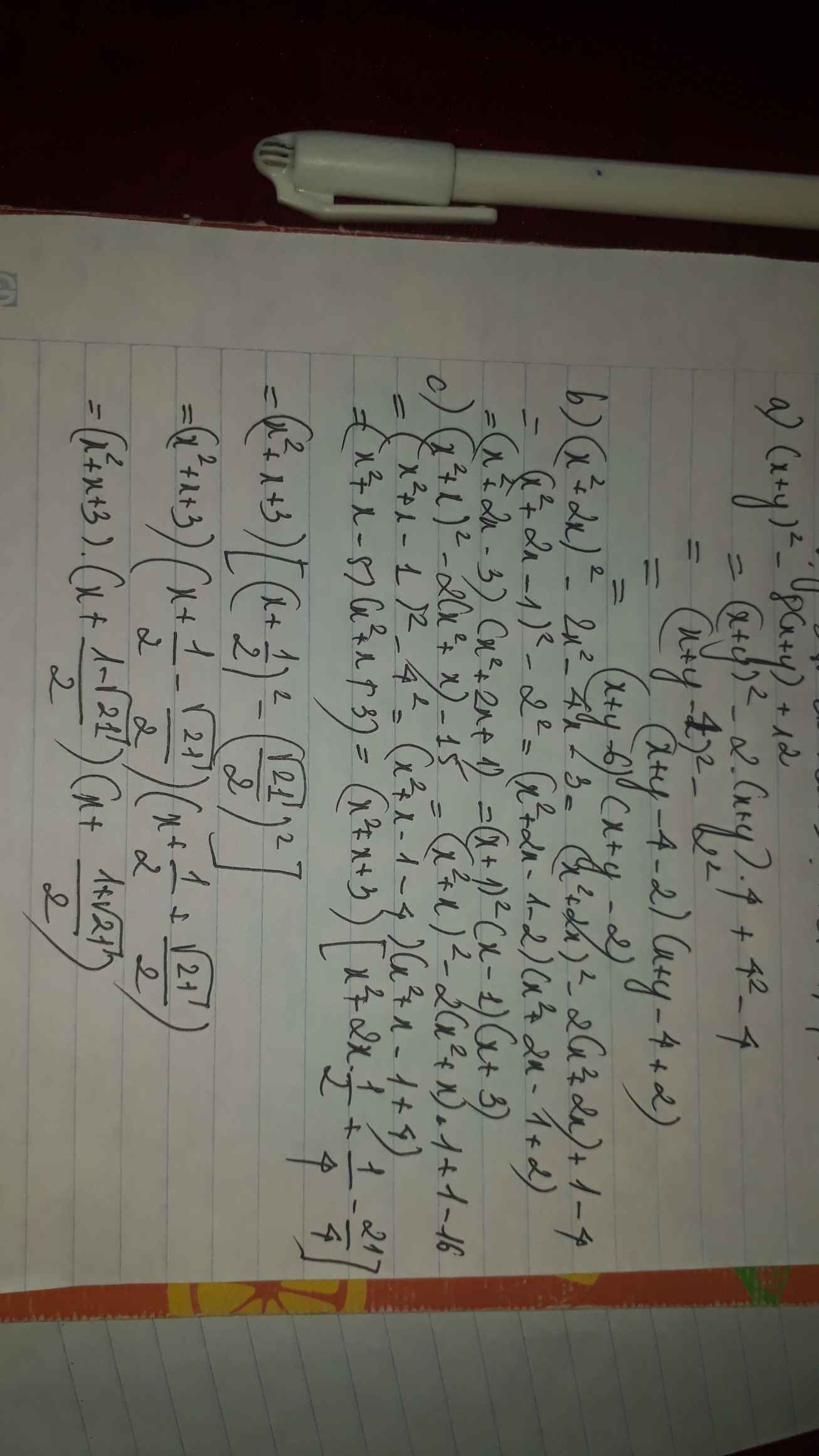tim x biết (x2-2x)2+2x2-4x-15=0

Những câu hỏi liên quan
a. (x – 1)(5x + 3) = (3x – 8)(x – 1)
b. 3x(25x + 15) – 35(5x + 3) = 0
c. (2 – 3x)(x + 11) = (3x – 2)(2 – 5x)
d. (2x2 + 1)(4x – 3) = (2x2 + 1)(x – 12)
e. (2x – 1)2 + (2 – x)(2x – 1) = 0
f. (x + 2)(3 – 4x) = x2 + 4x + 4
\(a,\left(x-1\right)\left(5x+3\right)=\left(3x-8\right)\left(x-1\right)\)
\(\left(x-1\right)\left(5x+3-3x+8\right)=0\)
\(\left(x-1\right)\left(2x+11\right)=0\)
\(\Rightarrow\orbr{\begin{cases}x-1=0\\2x+11=0\end{cases}\Rightarrow\orbr{\begin{cases}x=1\\2x=-11\end{cases}\Rightarrow}\orbr{\begin{cases}x=1\\x=-\frac{11}{2}\end{cases}}}\)
\(b,3x\left(25x+15\right)-35\left(5x+3\right)=0\)
\(15x\left(5x+3\right)-35\left(5x+3\right)=0\)
\(\left(5x+3\right).5\left(3x-7\right)=0\)
\(\Rightarrow\orbr{\begin{cases}5x+3=0\\5\left(3x-7\right)=0\end{cases}\Rightarrow\orbr{\begin{cases}5x=-3\\3x-7=0\end{cases}\Rightarrow}\orbr{\begin{cases}x=-\frac{3}{5}\\3x=7\end{cases}\Rightarrow}\orbr{\begin{cases}x=-\frac{3}{5}\\x=\frac{7}{3}\end{cases}}}\)
\(c,\left(2-3x\right)\left(x+11\right)=\left(3x-2\right)\left(2-5x\right)\)
\(\left(3x-2\right)\left(2-5x\right)+\left(3x-2\right)\left(x+11\right)=0\)
\(\left(3x-2\right)\left(2-5x+x+11\right)=0\)
\(\left(3x-2\right)\left(13-4x\right)=0\)
\(\Rightarrow\orbr{\begin{cases}3x-2=0\\13-4x=0\end{cases}\Rightarrow\orbr{\begin{cases}3x=2\\4x=13\end{cases}\Rightarrow}\orbr{\begin{cases}x=\frac{2}{3}\\x=\frac{13}{4}\end{cases}}}\)
còn đâu tự lm lười :_#
Xem thêm câu trả lời
phân tích đa thức thành nhân tử
a) (x+y)2-8(x+y)+12
b) (x2+2x)2-2x2-4x-3
c) (x2+x)2-2(x2+x)-15
a/ \(\left(x+y\right)^2-8\left(x+y\right)+12\)
\(=\left(x+y\right)\left(x+y-8+12\right)\)
\(=\left(x+y\right)\left(x+y+4\right)\)
==========
b/\(\left(x^2+2x\right)^2-2x^2-4x-3\)
\(=\left(x^2+2x\right)^2-\left(2x^2+4x\right)-3\)
\(=\left(x^2+2x\right)^2-2\left(x^2+2x\right)-3\)
\(=\left(x^2+2x\right)\left(x^2+2x-5\right)\)
===========
c/ \(\left(x^2+x\right)^2-2\left(x^2+x\right)-15\)
\(=\left(x^2+x\right)\left(x^2+x-2-15\right)\)
\(=\left(x^2+x\right)\left(x^2+x-17\right)\)
[---]
Đúng 2
Bình luận (0)
Tim hàm số bậc hai y = ax2 + bx + 5 (P) .Biết (P) có đỉnh là điểm A (1; 4)
A. y = x2 -2x +5 B. y = -x -2x + 5 C. y = -x2 - 2x + 5 D. y = 2x2 - 4x +5
Giải các phương trình sau:
g/ x(x + 3)(x – 3) – (x + 2)(x2 – 2x + 4) = 0
h/ (3x – 1)(x2 + 2) = (3x – 1)(7x – 10)
i/ (x + 2)(3 – 4x) = x2 + 4x + 4
k/ x(2x – 7) – 4x + 14 = 0
m/ x2 + 6x – 16 = 0
n/ 2x2 + 5x – 3 = 0
\(m,x^2+6x-16=0\)
\(\Leftrightarrow x^2-2x+8x-16=0\)
\(\Leftrightarrow x\left(x-2\right)+8\left(x-2\right)=0\)
\(\Leftrightarrow\left(x+8\right)\left(x-2\right)=0\)
\(\Leftrightarrow\left[{}\begin{matrix}x+8=0\\x-2=0\end{matrix}\right.\)
\(\Leftrightarrow\left[{}\begin{matrix}x=-8\\x=2\end{matrix}\right.\)
\(n,2x^2+5x-3=0\)
\(\Leftrightarrow2x^2-x+6x-3=0\)
\(\Leftrightarrow x\left(2x-1\right)+3\left(2x-1\right)=0\)
\(\Leftrightarrow\left(x+3\right)\left(2x-1\right)=0\)
\(\Leftrightarrow\left[{}\begin{matrix}x+3=0\\2x-1=0\end{matrix}\right.\)
\(\Leftrightarrow\left[{}\begin{matrix}x=-3\\x=\dfrac{1}{2}\end{matrix}\right.\)
Đúng 2
Bình luận (0)
\(k,x\left(2x-7\right)-4x+14=0\)
\(\Leftrightarrow2x^2-4x-7x+14=0\)
\(\Leftrightarrow2x\left(x-2\right)-7\left(x-2\right)=0\)
\(\Leftrightarrow\left(2x-7\right)\left(x-2\right)=0\)
\(\Leftrightarrow\left[{}\begin{matrix}2x-7=0\\x-2=0\end{matrix}\right.\)
\(\Leftrightarrow\left[{}\begin{matrix}x=\dfrac{7}{2}\\x=2\end{matrix}\right.\)
Đúng 2
Bình luận (1)
Xem thêm câu trả lời
Giải các phương trình tích sau:1.a)(3x – 2)(4x + 5) 0 b) (2,3x – 6,9)(0,1x + 2) 0c)(4x + 2)(x2 + 1) 0 d) (2x + 7)(x – 5)(5x + 1) 02. a)(3x + 2)(x2 – 1) (9x2 – 4)(x + 1) b)x(x + 3)(x – 3) – (x + 2)(x2 – 2x + 4) 0c)2x(x – 3) + 5(x – 3) 0 d)(3x – 1)(x2 + 2) (3x – 1)(7x – 10)3.a)(2x – 5)2 – (x + 2)2 0 b)(3x2 + 10x – 8)2 (5x2 – 2x + 10)2c)(x2 – 2x + 1) – 4 0 d)4x2 + 4x + 1 x24. a) 3x2 + 2x – 1 0 b) x2 – 5x + 6 0c) x2 – 3x + 2 0 d) 2x2 – 6x + 1 0 ...
Đọc tiếp
Giải các phương trình tích sau:
1.a)(3x – 2)(4x + 5) = 0 b) (2,3x – 6,9)(0,1x + 2) = 0
c)(4x + 2)(x2 + 1) = 0 d) (2x + 7)(x – 5)(5x + 1) = 0
2. a)(3x + 2)(x2 – 1) = (9x2 – 4)(x + 1)
b)x(x + 3)(x – 3) – (x + 2)(x2 – 2x + 4) = 0
c)2x(x – 3) + 5(x – 3) = 0 d)(3x – 1)(x2 + 2) = (3x – 1)(7x – 10)
3.a)(2x – 5)2 – (x + 2)2 = 0 b)(3x2 + 10x – 8)2 = (5x2 – 2x + 10)2
c)(x2 – 2x + 1) – 4 = 0 d)4x2 + 4x + 1 = x2
4. a) 3x2 + 2x – 1 = 0 b) x2 – 5x + 6 = 0
c) x2 – 3x + 2 = 0 d) 2x2 – 6x + 1 = 0
e) 4x2 – 12x + 5 = 0 f) 2x2 + 5x + 3 = 0
Bài 1:
a) (3x - 2)(4x + 5) = 0
<=> 3x - 2 = 0 hoặc 4x + 5 = 0
<=> 3x = 2 hoặc 4x = -5
<=> x = 2/3 hoặc x = -5/4
b) (2,3x - 6,9)(0,1x + 2) = 0
<=> 2,3x - 6,9 = 0 hoặc 0,1x + 2 = 0
<=> 2,3x = 6,9 hoặc 0,1x = -2
<=> x = 3 hoặc x = -20
c) (4x + 2)(x^2 + 1) = 0
<=> 4x + 2 = 0 hoặc x^2 + 1 # 0
<=> 4x = -2
<=> x = -2/4 = -1/2
d) (2x + 7)(x - 5)(5x + 1) = 0
<=> 2x + 7 = 0 hoặc x - 5 = 0 hoặc 5x + 1 = 0
<=> 2x = -7 hoặc x = 5 hoặc 5x = -1
<=> x = -7/2 hoặc x = 5 hoặc x = -1/5
bài 2:
a, (3x+2)(x^2-1)=(9x^2-4)(x+1)
(3x+2)(x-1)(x+1)=(3x-2)(3x+2)(x+1)
(3x+2)(x-1)(x+1)-(3x-2)(3x+2)(x+1)=0
(3x+2)(x+1)(1-2x)=0
b, x(x+3)(x-3)-(x-2)(x^2-2x+4)=0
x(x^2-9)-(x^3+8)=0
x^3-9x-x^3-8=0
-9x-8=0
tự tìm x nha
Đúng 0
Bình luận (0)
Tìm x:
a, x(2x – 3) – 2(3 – 2x) = 0
b, (x – 3)(x2 + 3x + 9) – x(x + 2)(x – 2) = 1
c, 4x2 + 4x – 6 = 2
d, 2x2 + 7x + 3 = 0
\(a,\Leftrightarrow\left(2x-3\right)\left(x+2\right)=0\Leftrightarrow\left[{}\begin{matrix}x=\dfrac{3}{2}\\x=-2\end{matrix}\right.\\ b,\Leftrightarrow x^3-27-x^3+4x=1\\ \Leftrightarrow4x=28\Leftrightarrow x=7\\ c,\Leftrightarrow4x^2-4x-8=0\\ \Leftrightarrow x^2-x-2=0\\ \Leftrightarrow\left(x-2\right)\left(x+1\right)=0\Leftrightarrow\left[{}\begin{matrix}x=2\\x=-1\end{matrix}\right.\\ d,\Leftrightarrow2x^2+6x+x+3=0\\ \Leftrightarrow\left(x+3\right)\left(2x+1\right)=0\Leftrightarrow\left[{}\begin{matrix}x=-3\\x=-\dfrac{1}{2}\end{matrix}\right.\)
Đúng 3
Bình luận (0)
Bài 1: Thu gọn các biểu thức saua)(2x2 + 5x - 2)(2x2 - 4x +3)b)(2x -3)(3x - 2) - 3x(2x - 5)c)(x -1)(x2 + x + 1) - (x + 1)(x2 - x +1)d)(x2 + x - 1)(x2 - x + 1)e)(2 + 3y)2 - (2x -3y)2 -12xyd)(x2 - 4x)(5 + 2x - x2)cảm ơn!giúp mình với chiều nay ktra 15ph T_T
Đọc tiếp
Bài 1: Thu gọn các biểu thức sau
a)(2x2 + 5x - 2)(2x2 - 4x +3)
b)(2x -3)(3x - 2) - 3x(2x - 5)
c)(x -1)(x2 + x + 1) - (x + 1)(x2 - x +1)
d)(x2 + x - 1)(x2 - x + 1)
e)(2 + 3y)2 - (2x -3y)2 -12xy
d)(x2 - 4x)(5 + 2x - x2)
cảm ơn!giúp mình với chiều nay ktra 15ph T_T
giúp mình giải bài này với
giải phương trình
a) ( x2-2x+1)- 4 = 0(x2-2x+1)-4=0
b) x2-x= -2x+2x2-x=-2x+2
c) 4x2+4x+1= x24x2+4x+1= x2
d)x2-5x+6= 0x2-5x+6=0
\(a.\left(x^2-2x+1\right)-4=0\\\Leftrightarrow \left(x-1\right)^2-2^2=0\\\Leftrightarrow \left(x-1-2\right)\left(x-1+2\right)=0\\ \Leftrightarrow\left(x-3\right)\left(x+1\right)=0\\\Leftrightarrow \left[{}\begin{matrix}x-3=0\\x+1=0\end{matrix}\right.\Rightarrow\left[{}\begin{matrix}x=3\\x=-1\end{matrix}\right.\)
Vậy tập nghiệm của phương trình trên là \(S=\left\{3;-1\right\}\)
\(b.x^2-x=-2x+2\\\Leftrightarrow x^2-x+2x-2=0\\\Leftrightarrow x\left(x-1\right)+2\left(x-1\right)=0\\\Leftrightarrow \left(x+2\right)\left(x-1\right)=0\\\Leftrightarrow \left[{}\begin{matrix}x+2=0\\x-1=0\end{matrix}\right.\Rightarrow\left[{}\begin{matrix}x=-2\\x=1\end{matrix}\right.\)
Vậy tập nghiệm của phương trình trên là \(S=\left\{-2;1\right\}\)
\(c.4x^2+4x+1=x^2\\ \Leftrightarrow4\left(x^2+x+\frac{1}{4}\right)-x^2=0\\ \Leftrightarrow4\left(x+\frac{1}{2}\right)^2-x^2=0\\ \Leftrightarrow\left[2\left(x+\frac{1}{2}\right)-x\right]\left[2\left(x-\frac{1}{2}\right)+x\right]=0\\ \Leftrightarrow\left[{}\begin{matrix}2\left(x+\frac{1}{2}\right)-x=0\\2\left(x+\frac{1}{2}\right)+x=0\end{matrix}\right.\Rightarrow\left[{}\begin{matrix}2x+1-x=0\\2x+1+x=0\end{matrix}\right.\Rightarrow\left[{}\begin{matrix}x=-1\\x=-\frac{1}{3}\end{matrix}\right.\)
Vậy tập nghiệm của phương trình trên là \(S=\left\{-1;-\frac{1}{3}\right\}\)
\(d.x^2-5x+6=0\\ \Leftrightarrow x^2-2x-3x+6=0\\\Leftrightarrow x\left(x-2\right)-3\left(x-2\right)=0\\ \Leftrightarrow\left(x-3\right)\left(x-2\right)=0\\\Leftrightarrow \left[{}\begin{matrix}x-2=0\\x-3=0\end{matrix}\right.\Rightarrow\left[{}\begin{matrix}x=2\\x=3\end{matrix}\right.\)
Vậy tập nghiệm của phương trình trên là \(S=\left\{2;3\right\}\)
Xem thêm câu trả lời
giải các phương trình:
a)(x2+x+1)2-2x2-2x=5
b)\(\dfrac{1}{\left(x-1\right)\left(x-3\right)}\)+x2-4x+5=0
Hãy giải các phương trình sau đây :
1, x2 - 4x + 4 = 0
2, 2x - y = 5
3, x + 5y = - 3
4, x2 - 2x - 8 = 0
5, 6x2 - 5x - 6 = 0
6,( x2 - 2x )2 - 6 (x2 - 2x ) + 5 = 0
7, x2 - 20x + 96 = 0
8, 2x - y = 3
9, 3x + 2y = 8
10, 2x2 + 5x - 3 = 0
11, 3x - 6 = 0
1) Ta có: \(x^2-4x+4=0\)
\(\Leftrightarrow\left(x-2\right)^2=0\)
\(\Leftrightarrow x-2=0\)
hay x=2
Vậy: S={2}
Đúng 1
Bình luận (0)
































